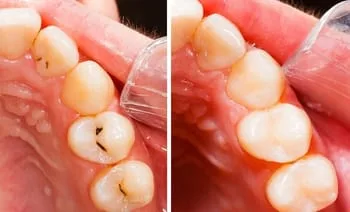Restorative

Tooth-Colored Fillings
The purpose of getting a filling is replacing and restoring your tooth structure that is damaged due to decay or fracture with an inert material. We will replace old, broken-down amalgam or metal fillings that contain traces of mercury with white composite fillings to restore your smile to a more natural look and feel.
With today’s advancements, no longer will you have to suffer the embarrassment of unsightly and unhealthy silver fillings or metal margins. Eliminate the dark, black appearance of your teeth with new, state-of-the-art tooth-colored resin or porcelain filling materials.
Dentures & Partials
Periodontal disease, injury, and tooth decay can all cause the loss of your natural teeth. However, we can bring back that smile on your face using dentures to restore your missing teeth. With improved technology and updated materials, dentists can now make them appear more natural and more comfortable for the patient.
Types of Dentures
There are two types of dentures: complete and partial. Ask your dentist might be the best option for you.
- Complete dentures cover the patient’s entire jaw.
- Partial dentures replace multiple missing teeth with a metal framework.
It may take some time to adjust to your dentures. Speaking and eating may feel different at first, but these regular activities will resume normally once you are accustomed to your dentures after a few weeks.
Extractions
General Extractions
An extraction is the complete removal of a tooth. Extractions are sometimes necessary if a primary tooth is preventing the normal eruption of a permanent tooth, if the tooth has suffered extensive tooth decay or trauma that cannot be repaired, the patient has gum disease, or if the tooth is impacted (usually wisdom teeth).
Depending on the complexity of the case, an extraction can be performed surgically or non-surgically. A mild anesthesia is used to ensure you or your child is as comfortable as possible throughout the procedure.
Wisdom Teeth
Your third molars are more commonly known as "wisdom teeth”. Usually appearing in the late teens or early twenties, third molars often lack the proper space in the jaw to erupt fully or even at all. This common condition is called impaction. When any tooth lacks the space to come through or simply develops in the wrong location on your jaw and becomes impacted, problems can arise. Primarily, damage to adjacent teeth and crowding can occur.
In certain cases, the wisdom tooth that cannot come through becomes inflamed under the gums and in the jawbone, causing a space to develop around the root of the tooth that then fills with liquid. This can cause a cyst or an abscess if it becomes infected. If either of these situations goes untreated, serious damage to the underlying bone, surrounding teeth, and tissues can result.
To potentially stave off this result, an extraction of one, several, or all of the wisdom teeth may be advised. If that is the case, we have the equipment and training needed to perform these extractions with minimal discomfort. Feel free to ask our staff for more information regarding tooth extractions if you feel you may need one.
Dental Implants
Dental implants are artificial tooth replacements that were first developed half a century ago by a Swedish scientist named Per-Ingvar Branemark. Implants arose from the patient’s need to secure loose-fitting dentures.
Since the advent of the implant, engineering and enhancements to the implant have enabled dentists to expand the implant’s usefulness, including the replacement of missing or lost teeth. Today, implant techniques provide a wide range of tooth replacement solutions including:
- Single Tooth Replacement
- Anterior Replacement
- Posterior Replacement
- Full Upper Replacement
If the missing tooth space has no surrounding teeth, the dentist may decide an implant is the most appropriate treatment choice or option.
Post Implant Care
Although proper oral hygiene is always recommended for maintaining good dental health, it is especially important after a patient has received a dental implant. Bacteria can attack sensitive areas in the mouth when teeth and gums are not properly cleaned, thus causing gums to swell and jaw bones to gradually recede.
Recession of the jawbone will weaken your implants and eventually make it necessary for the implant to be removed. Patients should visit their dentists at least twice a year to ensure the health of their teeth and implants. Dental implants can last for decades when given proper regular care.
Root Canal Treatment
A root canal is a procedure that extracts decayed pulp from the central part of the tooth, reshapes the canal, and replaces it with an anti-bacterial strengthening filler.
A cavity is the result of superficial decay of the enamel of the tooth. Left long enough, this decay can burrow into the deeper reaches of the tooth, causing extensive damage to tooth structure and the pulp. When the bacterial infection reaches the soft tissue, and abscess can form, and dentists must perform a root canal, or endodontic therapy. This preserves the tooth and its original integrity, saving a tooth that in the past would have to have been pulled.
Procedure
- The patient undergoes anesthesia.
- A dental dam is used to isolate the tooth.
- The tooth is opened to allow for removal of infected or dead dental pulp.
- The tooth is comprehensively cleaned, including any cracks and canals.
- With special tools, the doctor reshapes the canals.
- The tooth is filled again with cutting edge biocompatible filling material.
- A temporary covering is used to cover the access opening.
- Patients must see their regular dentist quickly for the permanent restoration of the tooth.
